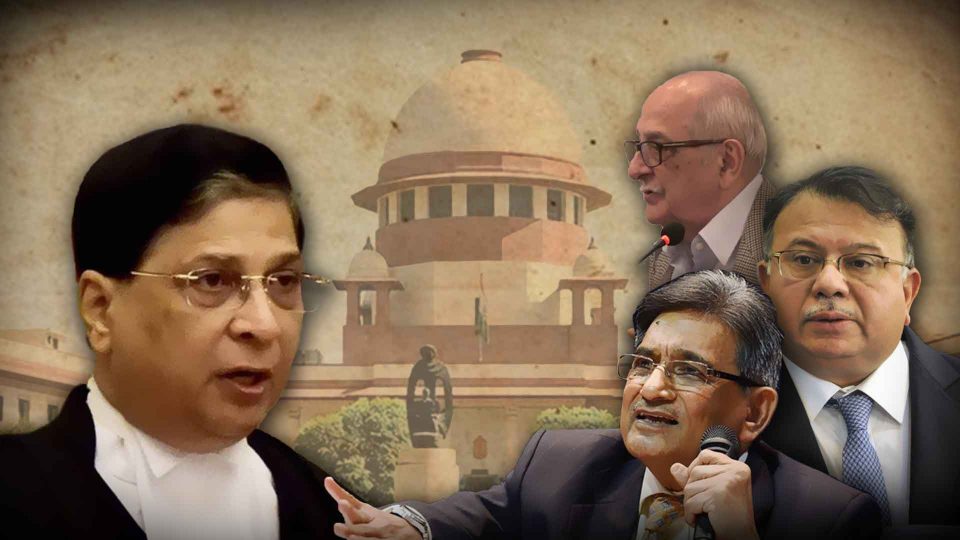It was Justice Lodha who was at the loggerheads with the present government over the matter of segregation in the recommendation.
The judicial conundrum is Supreme Court is turning shambolic. While the government’s move to stall the elevation of Justice Joseph Kurian has been condemned by the legal experts and noted jurists, the Chief Justice of India Dipak Mishra in a full court said that the Centre is “well within its right to send back the recommendation for reconsideration.
Now, former Chief Justice of India Justice R M Lodha has weighed in the matter calling the Centre’s move a strike on the independence of the judiciary. Justice Lodha who was in New Delhi on Thursday said that the government’s segregation rejecting the SC collegium recommendation to appoint Justice K M Joseph, at the same time cherry picking the recommendation to appoint Indu Malhotra, “strikes at the very heart of the independence of the judiciary.”
Justice Lodha blasted the Centre saying that the segregation is a part of interference of the ruling government in the working of the judiciary. Explaining the matter further, he said that the SC collegium recommends the judges’ appointment by seniority and to ensure a certain succession of future Chief Justices. However, he said, by segregating the recommendations, the government “throws out” the systematic plan of judiciary out of the window. “A whole new succession comes into play when the government simply sits over the file for a week and then picks selected recommendation while ignoring others,” he added.
It was Justice Lodha who was at the loggerheads with the present government over the matter of segregation in the recommendation. Justice RM Lodha who was the Chief Justice of India in the year 2014, was out of the country when the law ministry decided to segregate the recommendation of the collegium. Justice Lodha said that the government had certain problems with the elevation of Justice Gopal Subramanium. “This was very wrong. I wrote to the Law Minister on June 30, immediately upon my return that it was wrong,” said Justice Lodha. He also expressed to the government that this should not happen again in the future, with any Chief Justice.
However, the matter could not reach its logical conclusion as senior advocate Gopal Subramanium withdrew his name.
https://youtu.be/-m-r90nnP_s
Justice Lodha also said that ideally in such cases, it is the responsibility of the CJI to call the collegium meeting and take up the matter with the government. He stated, “Like the government, the Chief Justice too cannot sit over the file indefinitely.” He also mentioned that if reiteration of the recommendation is to be sent, it must be done immediately.
Justice Lodha also reminded that the Memorandum of Procedure which elaborates the transactions between the government and judiciary, also stresses that the government cannot segregate the names.
He further reiterated that it is not about seniority. “It is very clear why his elevation is facing resistance,” the former CJI said indicating towards the 2016 judgement of Justice KM Joseph to strike down the Centre’s recommendation to impose presidential rule in Uttarakhand.
On the other hand, Justice A P Shah-the former Chief Justice of Delhi High Court said that the incident indicates that the primacy of the collegium is being conceded. He also expressed surprise over the CJI’s stand on the matter. “I doubt if he has consulted his colleagues in the collegium before making this statement,”
In a letter to Justice Mishra, union law minister Ravi Shankar Prasad said the government’s rejection of Justice Joseph’s name has the approval of the President and the Prime Minister and also flagged that the SCs/STs have no representation in the Supreme Court since long.
“The proposed appointment of … Joseph as a Judge of the Supreme Court at this stage does not appear to be appropriate,” Prasad said in the letter. “It would also not be fair and justified to other more senior, suitable and deserving Chief Justices and senior judges of various High Courts.”
Justice Shah said, “Clearly the reason is his 2016 judgment against the Centre. The points raised about his so-called seniority are not relevant and he is the most suitable person for the job.”
One of the reasons stated by the government for refusing the recommendation to elevate Justice Joseph to the apex court was that it would distort regional representation in the highest court. However, Justice Shah rubbished the theory. He said, “As far as representation from Kerala is concerned, Justice Joseph, the only other Kerala Judge will retire in a few months.”
Criticising the Chief Justice of India for not taking up the matter with Government, he said, that the executive is demonstrating transgression into Judiciary. “Chief Justice is not even calling a meeting and is largely responsible for allowing the transgression,” he said.
One of the most noteworthy jurists and constitutional expert in India, Fali Nariman said that the decision taken by the collegium should be the final word and everything else is considered “malafide”. However, he suspected that the stalling of Justice Joseph’s elevation could be due to the Supreme Court’s decision to strike down the parliament’s decision to vote in favour of the National Judicial Appointments Commission (NJAC), which sought to control the appointment of judges. “The (government) is still very upset about that,” he said.
Meanwhile, Indu Malhotra is slated to take oath as the Supreme Court judge today.
As an independent media platform, we do not take advertisements from governments and corporate houses. It is you, our readers, who have supported us on our journey to do honest and unbiased journalism. Please contribute, so that we can continue to do the same in future.

